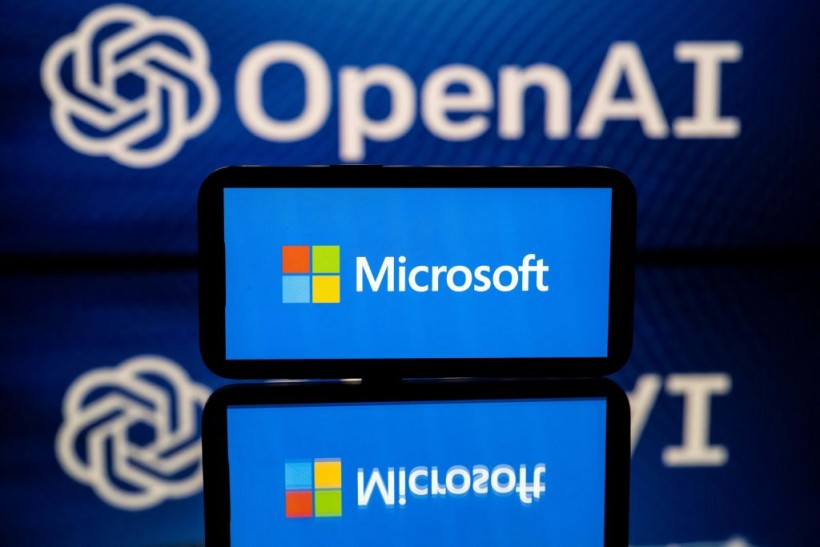Microsoft's latest software includes a powerful artificial intelligence (AI) assistant capable of summarizing meetings, presenting arguments, and handling emails, marking a leap toward AI-simplified tasks.
The technology, while impressive, underscores the importance of cautious and skillful use due to the complexities of large language models (LLMs). This development hints at a future where AI enhances efficiency while emphasizing the need for responsible utilization.

This picture taken on January 23, 2023 in Toulouse, southwestern France, shows screens displaying the logos of Microsoft and OpenAI.
Microsoft's New AI Assistant
Microsoft is spearheading a new era of AI, fundamentally altering how people interact with and benefit from technology. With the convergence of chat interfaces and large language models, individuals can now make requests in natural language, and the technology responds intelligently.
In a notable move, Microsoft introduces Microsoft Copilot, an everyday AI companion designed to integrate web intelligence, work data, and real-time PC activities to provide enhanced assistance while prioritizing privacy and security. This seamless experience is available in Windows 11, Microsoft 365, Edge, and Bing, functioning as an app or appearing with a right-click when necessary.
The ongoing evolution of Copilot aims to continuously improve and integrate with major applications, striving to create a unified experience across users' lives. Simultaneously, Microsoft unveils a range of new experiences and devices to enhance productivity, creativity, and everyday needs.
READ ALSO: 5 Ways AI and Machine Learning Elevate E-commerce Personalization and Recommendations
Caution and Challenges in Leveraging Large Language Models
Large Language Models (LLMs), such as ChatGPT and Copilot, leverage deep learning neural networks to understand user intent and generate responses based on the likelihood of various outcomes given a prompt.
While these models, like ChatGPT, can excel in providing quality responses to detailed task descriptions, it's essential to note that they lack genuine knowledge and rely on statistical patterns. As users stretch the limits of these systems beyond their original design, it becomes crucial to discern their intended purpose and avoid overreliance on technology for tasks that require human engagement.
Over-reliance on AI, particularly LLMs, poses significant challenges in terms of accuracy and reliability. Despite their intelligent-seeming responses, users must exercise caution and thoroughly evaluate the outputs of LLMs, ensuring alignment with the intended prompts.
Verification becomes more challenging in areas where users lack expertise, and relying on AI-generated outputs for critical tasks, such as meeting summaries or computer code, may lead to errors and misinterpretations.
In scenarios where LLMs are employed to transcribe and summarize meetings, there are risks related to reliability. Meeting notes generated by LLMs are based on language patterns and probabilities, requiring careful verification due to potential inaccuracies.
Additionally, using AI to generate computer code introduces complexities in validation, as real-world contextual nuances may not align with the expected outcomes. The lack of expertise among non-programmers in software engineering principles increases the risk of overlooking critical steps in the software design process, potentially resulting in code of unknown quality.
In using LLMs like ChatGPT and Copilot, experts underscore the necessity for cautious reliance on their outputs, emphasizing the importance of not blindly trusting them.
Positioned at the dawn of a technological revolution, the narrative points out the limitless possibilities of AI, asserting that its trajectory requires meticulous shaping, checking, and verification-a task currently entrusted to human beings.
RELATED ARTICLE: Retirement Homes Will Receive AI Robotic Companion Units "ElliQ" To Minimize Isolation Among Senior Citizens
Check out more news and information on Artificial Intelligence in Science Times.



![Earth's Quasi-Moon Kamo‘oalewa Could Originate From Lunar Surface Not Asteroid Belt [Study]](https://1721181113.rsc.cdn77.org/data/thumbs/full/53275/89/56/50/40/earths-quasi-moon-kamo-oalewa-could-originate-from-lunar-surface-not-asteroid-belt-study.png)










